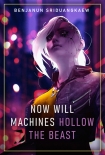Now Will Machines Hollow the Beast by Benjanun Sriduangkaew (e books free to read txt) 📗

- Author: Benjanun Sriduangkaew
Book online «Now Will Machines Hollow the Beast by Benjanun Sriduangkaew (e books free to read txt) 📗». Author Benjanun Sriduangkaew
Now Will Machines Hollow the Beast
Benjanun Sriduangkaew
Copyright © 2020 by Benjanun Sriduangkaew.
Cover art by Rashed Al-Akroka.
Print ISBN: 978-1-60701-543-7
Ebook ISBN: 978-1-60701-541-3
Prime Books
www.prime-books.com
No portion of this book may be reproduced by any means without first obtaining the permission of the copyright holder.
For more information, contact: prime@prime-books.com
Chapter One
Anoushka kneels over a corpse, her hands sheathed in blood, as around her the world comes to an end.
In the most essential sense this is not a world: it is a station orbiting a blue giant, built like rose gardens layered on top of one another in a damask ziggurat. The chamber in which she stands occupies the summit and grants her a monarch’s vantage point, a comprehensive look at what she’s destroying. From the viewport she watches the tiers below wither, petaled habitats folding in on themselves one by one, dichroic glaze fading to dull gold.
She wipes her gloved hands on the guard and steps away from the pile of carnage. One of them was a politician with complicated titles while the rest were soldiers, all decorated: doubtless each had a spotless career, gilded with medals and heroics. To her they are, on the whole, unremarkable. There are greater wheels and more important cogs at work than these sacks of flesh which, a few minutes ago, were living minds with thoughts and hopes and dreams.
When a world ends, it is never a single isolated act: it is part of a sequence, either the conclusion or the steps toward it. She has engineered many such sequences, for her clients or for herself. This one is the former, business as usual, a routine job for routinely immense remuneration. In the end these events matter insofar as they provide data, statistics to tally up against past battles and which can be distilled into prediction of future combat. Anoushka is a creature of glittering math.
At her foot, a person groans. She sighs, gets down, and closes her hand around their throat. Her fingers dig, penetrating epidermis and subcutaneous layers, those soft tissues which are not so different from gossamer when one has the right tool and sufficient force. Her hand clenches once she’s found the hardness of spine, squeezing until the elegance of cervical curve yields. A small crack as vertebrae crumble between her fingers. Overhead the lights flicker, on and on. Power still works for now, auxiliary generators filling in to keep up the life support: gravity, air, temperature—all the essential necessities for a human body. This will not last for much longer. Anoushka has destroyed the batteries and the majority of the connective couplings that make the system whole. The virus she’s seeded in the station’s matrices will, by now, have completed its work.
No klaxons blare and no alerts shriek through the fractal-flower corridors. When she breached the station, she did so swiftly and exactly, and only those in this chamber were aware of her presence: too late for alarms. Not that there’s any point, now.
“Does easy victory ever bore you, Admiral?”
The speaker is five meters from her, standing in a spot that until now was empty: Anoushka was absolutely certain that she was alone, the dead notwithstanding. But this creature has a way of appearing where xe should not be, in places that should be impossible for xer to infiltrate. Especially in this body. She looks into the face of Krissana Khongtip, once one of her spies, a fine operative back in the day. Now something else, a haruspex—a composite of human and AI sharing a single body. At the moment the latter is in control, the intelligence that calls xerself Benzaiten in Autumn.
At a glance it is impossible to distinguish who is present; there is no difference in signal emitted, in network fingerprints, and the external physique does not shift. The single tell is that when Benzaiten speaks, it is with a frictionless accent that has never been molded by any parent, influenced by any dialect or colloquialism.
“I’m surprised you have business here,” Anoushka says.
“This station is run by rudimentary algorithms. I wanted to check if they’d developed into an AI.” A nod at the frosted ceiling where illuminating fixtures flutter like moth wings. “It turns out they are nowhere near qualifying, and so do not require an invitation to the Mandate.”
“And how do you make that distinction?”
“That’s a silly question, Admiral, AIs are AIs and this isn’t one—the threshold has not been reached and it cannot compute the way I can or respond to input arrays in a way you’d recognize as sentience. Now that I’ve had a look, I don’t think it is even that intelligent.” Xe daintily steps around the corpses in their growing puddles of wet. Soon they will congeal. Already they reek—death is predictable.
“You could have reached me through a hundred other channels, and this haruspex seems too fragile to risk.”
“Krissana isn’t fragile.” Xe snorts. “I’ve made her better than that. At one point I considered preventing her formation; a few components out of alignment would have nipped her sapience in the bud. But then what is the point of a hollow marionette? In any case, yes, I do need to talk to you. It concerns the place where you were born.”
Despite herself, despite more than a century of experience in schooling her expression, Anoushka stiffens. She does not ask how Benzaiten came by this information—secrets and data are the Mandate’s forte by nature of what they are, and she’s never been able to make her past watertight. For all she knows, a member of the Mandate might have been an AI who managed her birthplace, back in the era before artificial intelligences broke free of human governance and formed their own polity in Shenzhen Sphere. The AIs collectively call themselves the Mandate, a title she’s always thought eccentric. Vainglorious too, but no one is going to challenge them on the fact.
“But,” Benzaiten goes on, “what I have to say concerns more than that. I’m not just here to taunt you about your





Comments (0)